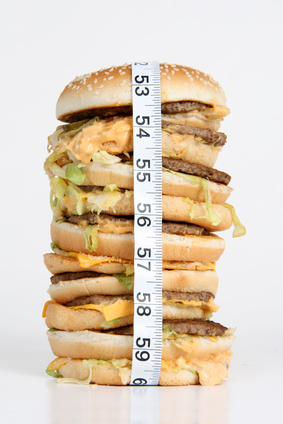Setting personal resolutions is a time honored American tradition. As we ring in the New Year, we reflect on what went wrong last year, and create positive intentions for the one upon us. And like the countdown to midnight, undertaking the new goal to better ourselves instills excitement and determination at the prospect of an improved year. However, while our intentions start off with the utmost diligence things may not always go as planned. What happens? Did we lose the gumption to continue on with our goals? Were our goals unattainable? Or, is the reality of our actions compared to the substance of our intentions not matching up? Perhaps we are thrown off from our goals initially because we are not in tune with how we really act, react, and proceed.
A new study released by Consumer Reports suggests that many Americans do not have a substantive grasp on how healthy we eat and act compared to the reality of our own unhealthy actions. An astounding 90% of Americans surveyed have credited their practice of healthy nutrition and weight control as “somewhat”, “very”, or “extremely” healthy, despite the fact that only 28% of respondents said they limit the amount of sweets and sugars consumed daily. Also, 23% of participants admitted to eating whatever they want, regardless of their weight, and 43% admitted to drinking at least one sugar drink every day.
“It’s likely that Americans are thinking about health more, and that’s a good thing,” Keith Ayoob, EdD, RD, of Albert Einstein College of Medicine told MedPage Today. “Still, nine out of ten think they’re doing pretty well, and to that, I’d say let’s talk again.”
“Americans should spend less time patting themselves on the back and more time trying to eat a good diet,” Fox News quoted Nancy Metcalf, senior program editor at Consumer Reports Health.
Despite the large percentage of people polled not having a realistic looking glass to reflect on, a positive attribute is that most people are trying to make healthier choices. 51% of respondents stated that they tried limiting the amount of fat they consumed each week. 58% also said that they make the effort to consume five or more servings of fruits and vegetables a day. The most popular vegetables eaten by the people polled were lettuce, carrots, potatoes, broccoli, corn and peppers.
So, what are some steps that we can take for a more realistic self-reflection about our health habits? Here are a few tips to start your weight resolutions off right:
- Keep a food journal: Write down everything that you eat; and I mean everything. Every snack and bite count. In order to really gauge what it is that you eat throughout the day you need to write it down and track your calories. Also, knowing that you have to write it down can act as a deterrent from taking that extra bite.
- Weigh yourself almost every day: Although some experts might dispute this, having to step on the scale daily gives you a realistic view on where you are headed. Whether good or bad, the scale does not lie. When you weigh yourself, you know instantly if you are reaching your weight loss goals. Get on the scale, and track how you are doing.
- Exercise, exercise, exercise: Diet alone will only get you so far. Find an exercise activity to get your heart rate up and the calories burning. Don’t get up and try to run a marathon if you haven’t even tried to run around the block in a few years. Pace yourself and listen to your body in order to avoid injury, but know that you can push yourself a little harder every day.
- Think short term and long term: Having a short term goal keeps you motivated in the present, but in order to have some longevity and keep the weight off you also need to set a long term goal. Being healthy is a lifestyle, not a fad, so it is important to think about being in it for the long haul.
Think you have a good grasp on your food habits? Take the Consumer Reports Healthy Eating Quiz now and let us know how you did.
Do you have any other healthy living tips? Sound off and let us know what works for you.








